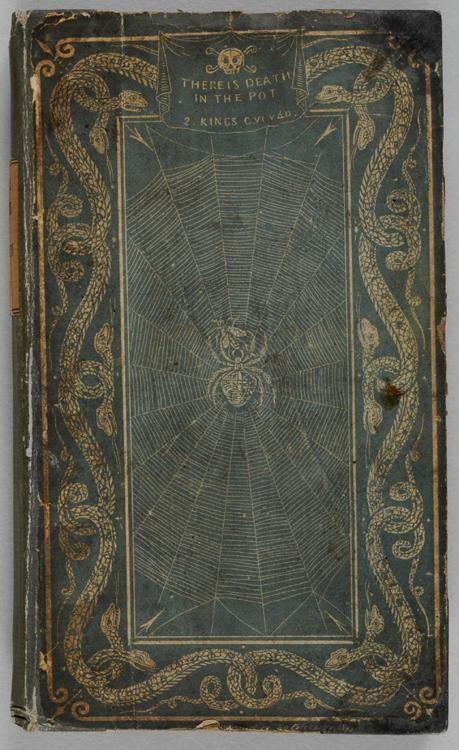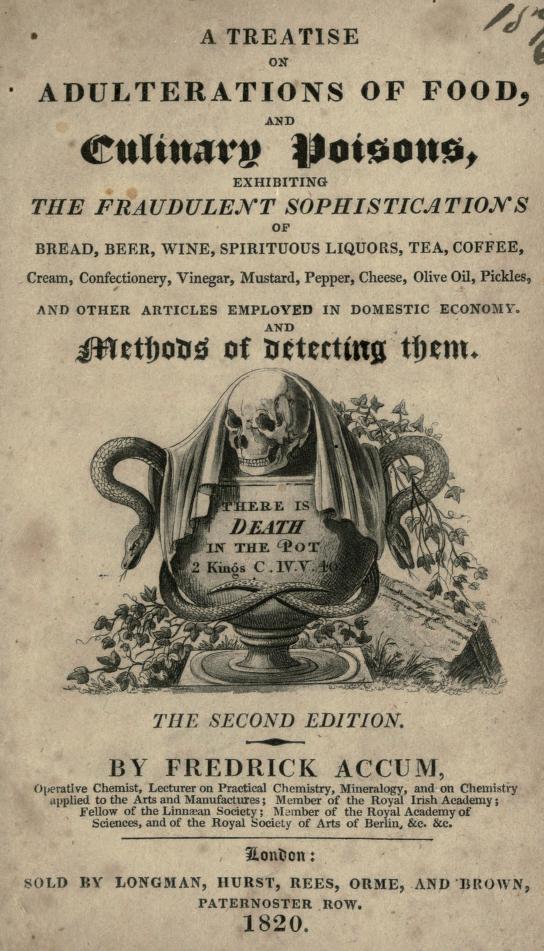By: Katherine Lattal, Galter Library Special Collections volunteer
 Friedrich Accum, 1820 - A Treatise on the Adulterations of Food and Culinary Poisons, Exhibiting the Fraudulent Sophistications of Bread, Beer, Wine, Spiritous Liquors, Tea, Coffee, Cream, Confectionary, Vinegar, Mustard, Pepper, Cheese, Olive Oil, Pickles, and other Articles Employed in Domestic Economy, and Methods of detecting them.
Friedrich Accum, 1820 - A Treatise on the Adulterations of Food and Culinary Poisons, Exhibiting the Fraudulent Sophistications of Bread, Beer, Wine, Spiritous Liquors, Tea, Coffee, Cream, Confectionary, Vinegar, Mustard, Pepper, Cheese, Olive Oil, Pickles, and other Articles Employed in Domestic Economy, and Methods of detecting them.
At first glance, this book may seem to be advice from a quack doctor railing against all sorts of foods, but Friedrich Accum’s Treatise on the Adulterations of Food and Culinary Poisons is a progenitor of the movement to question the healthfulness of processed foods and the scruples of those who produce them. Accum’s book, published in 1820, caused such a sensation in London that it made him enemies in the scientific community and may have even forced him to leave his adopted country.
Born in 1769 in Germany, Friedrich Accum apprenticed as an apothecary and chemist in Hanover and London. He is known primarily for three things: helping to popularize chemistry as a scientific discipline in England; advocating for the implementation of gas lighting; and attacking the growing problem of processed foods. In Treatise, Accum distinguishes between processed foods that are of inferior value but do not affect health per se, e.g. arrowroot powder used to thicken milk to create fraudulent cream, and those products that are deleterious to health, e.g. adding sulphuric acid to vinegar to increase the acidity. Regardless of this difference, Accum maintained that consumers deserve to know what ingredients make up the products they buy. To this end he included information on vendors who had been convicted of producing or selling adulterated food, which no doubt helped to make his name unwelcome to many Londoners.
In addition to information about current food adulteration and counterfeiting, Accum included simple chemical experiments so that average people without knowledge of chemistry could test their purchased foods. For example, cookbooks of the period often called for cooks to add copper when making pickles to render them vividly green. Accum advises:
To detect the presence of copper, it is only necessary to mince the pickles, and to pour liquid ammonia, diluted with an equal bulk of water, over them in a stopped phial: if the pickles contain the minutest quantity of copper, the ammonia assumes a blue colour. (Accum, Treatise, 309)
 In a time of great scientific discovery in chemistry (Accum was a contemporary of Humphry Davy), Accum saw the dignity and purity of this discipline being perverted by unscrupulous vendors to aid them in ripping off common men and women. Accum held it as his moral duty to the average person to provide these simplified and easy-to-use applications of chemistry to thwart the deceptions of counterfeiters. There is something very empowering for the average person of the time to be able to conduct these tests themselves and undoubtedly Accum hoped to provide his audience with some amount of self-reliance when it came to understanding what they were consuming.
In a time of great scientific discovery in chemistry (Accum was a contemporary of Humphry Davy), Accum saw the dignity and purity of this discipline being perverted by unscrupulous vendors to aid them in ripping off common men and women. Accum held it as his moral duty to the average person to provide these simplified and easy-to-use applications of chemistry to thwart the deceptions of counterfeiters. There is something very empowering for the average person of the time to be able to conduct these tests themselves and undoubtedly Accum hoped to provide his audience with some amount of self-reliance when it came to understanding what they were consuming.
Also interesting to note is the eye-catching and foreboding imagery of the book itself. The cover features spider and snake motifs designed no doubt to make one’s skin crawl, and crowning it all is a heraldic skull and crossbones featuring an ominous verse from the Old Testament Bible - "There is death in the pot." Equally interesting is the title page which presents the title in a variety of fonts characteristic of the 19th century printing and includes more imagery geared to disquiet readers. This book’s novel approach of food safety and its beautiful design make it a valuable edition in Galter Library's Special Collections.
If you are interested in viewing Friedrich Accum’s Treatise on the Adulterations of Food and Culinary Poisons or other rare books available at Galter Health Sciences Library, please contact Special Collections at ghsl-specialcollections@northwestern.edu for an appointment.
Updated: March 5, 2020